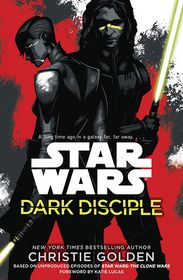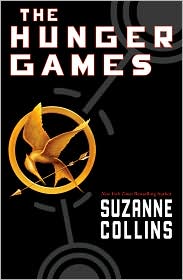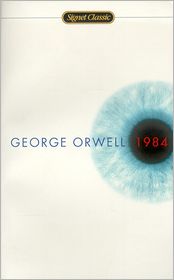5 Dystopian Societies That Might Actually Function
 Dystopia is—ironically for something pretty terrible—disturbingly popular these days. While a good dystopian government has always been a fun way to depict our inevitably awful future (I patiently await my sexless utilitarian jumpsuit and dish of Soylent Green), there are often a lot of missing details. Like, for example, how can an incredibly ridiculous (but evil) government can survive for more than five minutes without a functioning economy or large-scale military force? At least in her classic “bad future” novel The Handmaid’s Tale, Margaret Atwood heavily implies that the Republic of Gilead is both relatively new, and more or less unstable and doomed to failure. Many writers just beg for your suspension of disbelief.
Dystopia is—ironically for something pretty terrible—disturbingly popular these days. While a good dystopian government has always been a fun way to depict our inevitably awful future (I patiently await my sexless utilitarian jumpsuit and dish of Soylent Green), there are often a lot of missing details. Like, for example, how can an incredibly ridiculous (but evil) government can survive for more than five minutes without a functioning economy or large-scale military force? At least in her classic “bad future” novel The Handmaid’s Tale, Margaret Atwood heavily implies that the Republic of Gilead is both relatively new, and more or less unstable and doomed to failure. Many writers just beg for your suspension of disbelief.
Not everyone goes the lazy route when imagining how a tyrannical government might actually make it work. Here are 5 examples of fictional (thank goodness) dystopian governments that seem plausibly likely to function, at least until a pesky heroic teenager leads a revolution.
Dark Disciple: Star Wars
Dark Disciple: Star Wars
By
Christie Golden
Foreword by
Katie Lucas
Hardcover
$24.99
$28.00
The Empire (Star Wars)
Say what you will about the Star Wars prequels (and there is so much to say about them), but Lucas did one thing relatively well: he detailed exactly how the sleepy Republic became the evil Galactic Empire. The reason this dystopia might actually work is simple enough: the new Emperor, aside from having evil powers and a brief monopoly on The Force, also inherited a functioning bureaucracy and immense military machine, not to mention, like Augustus in Rome, the legal authority to back up his claim to power. The Empire might have gone on for a very long time, if not for those meddling kids.
The Empire (Star Wars)
Say what you will about the Star Wars prequels (and there is so much to say about them), but Lucas did one thing relatively well: he detailed exactly how the sleepy Republic became the evil Galactic Empire. The reason this dystopia might actually work is simple enough: the new Emperor, aside from having evil powers and a brief monopoly on The Force, also inherited a functioning bureaucracy and immense military machine, not to mention, like Augustus in Rome, the legal authority to back up his claim to power. The Empire might have gone on for a very long time, if not for those meddling kids.
Brave New World
Brave New World
Paperback $15.00
The World State (Brave New World, by Aldous Huxley)
Huxley is one of the few creators of a dystopia to have addressed the wide-ranging difficulties faced in running a large-scale society predicated on complete control. Whereas many dystopias amount to a single concept that supposedly rules everyone’s lives, back in 1932 Huxley figured out that it would take constant effort to reshape the way people think and behave. His society uses medical, pharmaceutical, and educational techniques to ensure compliance, and the detailed examination is convincing in its thoroughness—possibly because even eight decades later you can still see the seeds of that society in our own.
The World State (Brave New World, by Aldous Huxley)
Huxley is one of the few creators of a dystopia to have addressed the wide-ranging difficulties faced in running a large-scale society predicated on complete control. Whereas many dystopias amount to a single concept that supposedly rules everyone’s lives, back in 1932 Huxley figured out that it would take constant effort to reshape the way people think and behave. His society uses medical, pharmaceutical, and educational techniques to ensure compliance, and the detailed examination is convincing in its thoroughness—possibly because even eight decades later you can still see the seeds of that society in our own.
The Hunger Games (Hunger Games Series #1)
The Hunger Games (Hunger Games Series #1)
In Stock Online
Paperback $14.99
Panem (The Hunger Games, by Suzanne Collins)
At first blush, Collins’ dystopia seems to play fast and loose with the future: Panem is divided up into Districts, each of which provides basically one thing—coal, wheat, livestock—with the citizens of each District doomed to remain there, regardless of their talents or wishes. But this system might actually work if the central government put enough effort into stopping people from cheating, which it apparently does (if you consider slaughtering dissenters effort). The reason it might work is simple: the government is artificially controlling supply, demand, and wages everywhere, simultaneously, which create systemic stability—again, assuming no meddling kids get big ideas. It’s almost like there would be no stories at all if not for those meddling kids.
Panem (The Hunger Games, by Suzanne Collins)
At first blush, Collins’ dystopia seems to play fast and loose with the future: Panem is divided up into Districts, each of which provides basically one thing—coal, wheat, livestock—with the citizens of each District doomed to remain there, regardless of their talents or wishes. But this system might actually work if the central government put enough effort into stopping people from cheating, which it apparently does (if you consider slaughtering dissenters effort). The reason it might work is simple: the government is artificially controlling supply, demand, and wages everywhere, simultaneously, which create systemic stability—again, assuming no meddling kids get big ideas. It’s almost like there would be no stories at all if not for those meddling kids.
1984: 75th Anniversary
1984: 75th Anniversary
By
George Orwell
Introduction
Dolen Perkins-Valdez
Afterword
Sandra Newman
In Stock Online
Paperback $10.99
Oceania (1984, by George Orwell)
Similar to Huxley’s Brave New World, Orwell’s dystopia becomes possible through its focus on the little things. Big Brother, as it turns out (seventy-year old spoiler alert), is both the oppressive government and the spunky rebellion. The resources put into monitoring citizens is equaled only by the resources put into designing a honey trap of sorts for the few who retain a spark of imagination—tellingly, the whole story is about how the government identifies, traps, and punishes those who deviate from its commands. Which, realistically, is pretty much all a government like that would have time and resources for.
Oceania (1984, by George Orwell)
Similar to Huxley’s Brave New World, Orwell’s dystopia becomes possible through its focus on the little things. Big Brother, as it turns out (seventy-year old spoiler alert), is both the oppressive government and the spunky rebellion. The resources put into monitoring citizens is equaled only by the resources put into designing a honey trap of sorts for the few who retain a spark of imagination—tellingly, the whole story is about how the government identifies, traps, and punishes those who deviate from its commands. Which, realistically, is pretty much all a government like that would have time and resources for.
The Water Knife
The Water Knife
Hardcover $25.95
The United States, Five Minutes from Now (The Water Knife by Paolo Bacigalupi)
This one may not seem like a proper dystopia—better to call it a snapshot of a dystopia in the making. It imagines a world five minutes in the future where current drought trends have rendered the Southwestern U.S. a dry hell, and water power brokers control not just water, but life itself. Corporations battle in court over water rights, seeking older and older treaties and deeds to trump their rivals, and violently cutting the pipes and turning off the flow once they’ve retained ownership. It’s this legal wrangling that makes Bacigalupi’s vision so chillingly real: corporations have fought tooth-and-nail over water in the past, and now that it seems to be drying up, it’s very easy to believe they will again, bringing the brutal world of The Water Knife into reality.
It’s easy to imagine one detail—a lack of choice, constant surveillance—and feel like your work as an author is done. But as these five books prove, it takes a bit more planning and thought to render a functional evil government on the page. Any others we missed?
The United States, Five Minutes from Now (The Water Knife by Paolo Bacigalupi)
This one may not seem like a proper dystopia—better to call it a snapshot of a dystopia in the making. It imagines a world five minutes in the future where current drought trends have rendered the Southwestern U.S. a dry hell, and water power brokers control not just water, but life itself. Corporations battle in court over water rights, seeking older and older treaties and deeds to trump their rivals, and violently cutting the pipes and turning off the flow once they’ve retained ownership. It’s this legal wrangling that makes Bacigalupi’s vision so chillingly real: corporations have fought tooth-and-nail over water in the past, and now that it seems to be drying up, it’s very easy to believe they will again, bringing the brutal world of The Water Knife into reality.
It’s easy to imagine one detail—a lack of choice, constant surveillance—and feel like your work as an author is done. But as these five books prove, it takes a bit more planning and thought to render a functional evil government on the page. Any others we missed?




